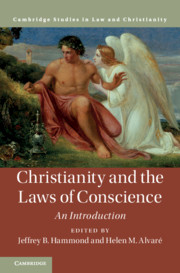Book contents
- Christianity and the Laws of Conscience
- Law and Christianity
- Christianity and the Laws of Conscience
- Copyright page
- Dedication
- Contents
- Contributors
- Acknowledgments
- Introduction
- Part I Themes in Understandings of Conscience in Christianity
- Part II Conscience According to Major Figures and Traditions
- 5 Conscience in the Early Church Fathers
- 6 St. Thomas Aquinas on Conscience
- 7 Reforming the Conscience
- 8 Toward a Theology of a Redeemed Conscience
- 9 Pierre Bayle
- 10 Freedom of Conscience and Its Right to Constitutional Protection
- 11 Jonathan Edwards on Conscience
- 12 Obeying God Rather Than Men
- 13 Mormonism and Conscience
- 14 Culture and Conscience in the Thought of Joseph Ratzinger, Pope Benedict XVI
- Part III Applied Topics in Law and Conscience
- Index
- References
5 - Conscience in the Early Church Fathers
from Part II - Conscience According to Major Figures and Traditions
Published online by Cambridge University Press: 12 June 2021
- Christianity and the Laws of Conscience
- Law and Christianity
- Christianity and the Laws of Conscience
- Copyright page
- Dedication
- Contents
- Contributors
- Acknowledgments
- Introduction
- Part I Themes in Understandings of Conscience in Christianity
- Part II Conscience According to Major Figures and Traditions
- 5 Conscience in the Early Church Fathers
- 6 St. Thomas Aquinas on Conscience
- 7 Reforming the Conscience
- 8 Toward a Theology of a Redeemed Conscience
- 9 Pierre Bayle
- 10 Freedom of Conscience and Its Right to Constitutional Protection
- 11 Jonathan Edwards on Conscience
- 12 Obeying God Rather Than Men
- 13 Mormonism and Conscience
- 14 Culture and Conscience in the Thought of Joseph Ratzinger, Pope Benedict XVI
- Part III Applied Topics in Law and Conscience
- Index
- References
Summary
Alexis Torrance considers early Church Fathers’ many treatments of the origins and roles of conscience in patristic literature. Contemporary commentators are especially prone to speak of conscience to affirm private judgments about personal feelings. Early Church Fathers, however, stressed that conscience is a communal gift presupposing shared convictions. They also stressed that conscience may become impaired under a variety of influences. The idea of conscience existed in Greek and Roman culture. Christians’ reflections, especially St. Paul, were crucial to the deliberations of Church Fathers. New Testament letters speak of conscience as a human faculty. Though not God’s voice, conscience does bring God’s voice to bear in our lives. Christian innovation connected conscience with the idea of a divine law, and some patristic authors identify conscience with a natural law. Human knowledge of right and wrong will be clouded by sin, thus conscience needs cleansing, by baptism, by following the commandments, and by continual examination of conscience and confession. It continually requires the grace of the Holy Spirit to govern one’s moral action in a way that might lead to God.
- Type
- Chapter
- Information
- Christianity and the Laws of ConscienceAn Introduction, pp. 93 - 111Publisher: Cambridge University PressPrint publication year: 2021



